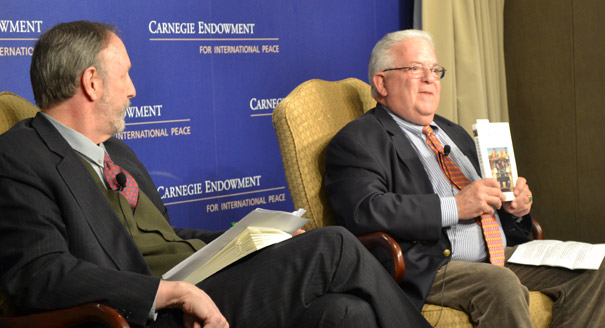Registration
You will receive an email confirming your registration.
Richard Nixon’s 1972 decision to normalize relations with the Peoples’ Republic of China changed the global political balance in deep and lasting ways. While today’s U.S.-China relationship—a direct result of that groundbreaking trip—is in a place few could have imagined in 1972, it faces many difficult challenges in the coming years. As the two powers move forward and stakes grow larger, it will become even more important to manage the relationship in a pragmatic and sensible manner—one the historical record suggests cannot be taken for granted.
From his beginnings as Nixon’s interpreter on the president's first trip to China, throughout his 30-year career in the foreign service, and in subsequent decades, Chas W. Freeman, Jr. has been deeply involved in the U.S.-China relationship. One of the most informed observers of China, Freeman discussed his experiences and his recently released book Interesting Times: China, America, and the Shifting Balance of Prestige. Carnegie’s Michael Swaine moderated.
China in Transition
- Growth in Influence: It is difficult to overstate the speed or scope of changes in China and in China’s foreign relations over the past forty-odd years, Freeman said. The basis for China’s dramatic expansion in global influence has been its remarkable economic growth; however, China’s unique economic system is not well understood either in China or abroad, Freeman argued, nor is it transferrable to other countries. “Cadre capitalism” makes China’s state-owned enterprises formidably competitive, but also relies upon and promotes cronyism, he added.
- Demographic Effects: China has a rising middle class of enormous proportions, a group that craves predictability and certainty and will increase pressure on the government to improve rule of law, Freeman said. He disagreed with the prevailing view that China will suffer terribly from growing old before it grows rich. In contrast to the United States, he said that China has designed a sustainable social security system that precludes unfunded liabilities, while advances in robotics promise to allow employers increasingly to replace an aging labor force with machines.
- A New Development Model: China’s development model, launched in 1978, will need to adapt to changing circumstances, Freeman argued. New leaders will attempt to shift to a consumption-driven economy, tackle IPR and innovation issues, and implement economic, legal, and political reforms. Freeman described a sense of genuine urgency among the Chinese leadership, who understand that the party faces potential legitimacy challenges if they do not solve these problems.
International Governance
- New World Order?: China’s enthusiastic participation in Western-created global governance structures like the United Nations should be seen as a great achievement of U.S. diplomacy, Freeman said. The question of creating a “new global order” is an interesting point of tension in U.S.-China relations, he continued, because it is actually the United States and not China that wishes to act outside existing rules and institutions.
- Towards Multipolarity: U.S. domestic problems, including fiscal, strategic, and leadership deficits, could continue to constrain its ability to craft global strategy, Freeman said. A new BRICS proposal for parallel set of institutions is an expression of the perception that old institutions are not responsive to the needs of a global order that is shifting toward devolution of authority and multipolarity, Freeman added.
The State of U.S.-China Relations
- Role of Misperceptions: A key theme of Interesting Times, Swaine said, is the role that misperceptions play in shaping U.S.-China relations. The American view is that a great power will seek to obtain military supremacy, but China does not necessarily share this set of priorities. The book argues that China is not interested pursuing military dominance in Asia or beyond it, but that imprudent U.S. policy could push it into taking a more aggressive stance.
- Rebalancing to Asia: Overall, the U.S. rebalancing initiative reflects a sound strategic judgment that Asia requires greater strategic attention from the United States, Freeman said, but it cannot succeed if it overlooks the new realities brought about by China's rise, the greater capabilities of its Asian neighbors, and the interdependence of their economies. Washington can provide reassurance and facilitate mutual accommodation between China and these neighbors, he continued, but it should not attempt to impede the crafting of new and more stable relations between its Asian allies and partners and China or compel them to choose between it and Beijing. The United States should avoid overextending itself or becoming entangled in territorial disputes that are unrelated to its national interests, he concluded.
- Resolvable Problems: Freeman said that Taiwan and disputed island territories are potential flashpoints for conflict between China and the United States, but added that he was optimistic that the parties to these disputes could find mutually agreeable solutions. However, Freeman said, resolving bilateral disputes will require more sustained attention and high-level statecraft than either country is currently pursuing.
